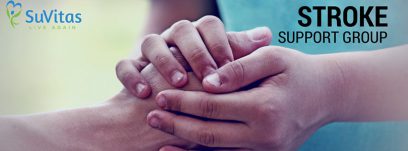Ten Reasons why One should Opt for Rehabilitation Services after Stroke
Stroke is classically characterized as a neurological deficit attributed to an acute focal injury of the central nervous system (CNS) by a vascular cause, including cerebral infarction, intracerebral hemorrhage (ICH), and subarachnoid hemorrhage (SAH), and is a major cause of disability and death worldwide. In Layman’s term stroke is the sudden death of brain cells due to lack of oxygen, caused by blockage of blood flow or rupture of an artery to the brain.
Having a stroke can be a very significant experience, both in the life of the patient as well as their loved ones. Any serious medical condition really does remind us of our mortality and stresses the need to take care of our body and health.
Rehabilitation services play an important role in helping the patient get back to his normal life. Here we have compiled a list of ten reasons why one should opt for rehabilitation services after stroke:
Skillfully Trained Individuals are there to Take Proper Care
Rehabilitation service centers come up with trained experts in order to provide every possible care to the patients. They know the exact needs of the patients and they treat accordingly.
Continuous Care
Depending on the severity of the stroke, the patient may be in need of significant care and attention that a typical nuclear family with working members might not be able to provide. Rehabilitation centers have staff round the clock to attend to the every need of the patient.
Constant Supervision
Individuals who have recently suffered a stroke are under the huge risk of recurrence or further complications arising out of the single incident. As such, it is very important to keep an eye on them at all times. Rehabilitation centers have experts trained to recognize any warning signs and bring proper attention to them immediately.
Building up Motor Skills
Specialized exercises are needed to help with regaining fine motor skills and involuntary reflexes, like swallowing for example, after a stroke. Rehabilitation centers have therapists dedicated to improving these functions.
Mobility Training
Rehabilitation service centers have the most proficient physical therapists who provide the right kind of assistance to the patients after the surgery. With the help of the mechanical aids like crutches or walkers and the right techniques, they help the patient’s body to relearn the simple activities like walking and standing.
Communication Therapy
Strokes have far-reaching consequences in communicative activities like talking, writing, listening to speech and comprehending it properly. Speech language therapy is necessary to regain these vital skills.
Psychological Effects
A stroke can have emotional effects as well, resulting in mood swings, depression and a lack of adjustment to normal life post the incident. In these cases, a trained psychologist must test the patient’s cognitive skills and aid in their recovery using therapy and medication.
Occupational Therapy
A person who has suffered through a stroke must relearn even the most basic of activities like dressing, eating, writing, bathing as he cannot do these on his own at the beginning. This inability may also spike further psychological problems, making occupational therapy crucial for proper and complete recovery.
Support Groups
Sometimes, nothing can be more powerful than empathy. Listening to people who have suffered through the same incident can have a larger impact than any amount of love and care. Having the ability to connect with other people via shared experiences makes support groups a remarkably effective means of recovery.
Diet
It is very essential to follow a healthy diet and consume the right kind of food at the right time for the optimum recovery following a stroke, and this can be done under the supervision of a trained dietician, which the rehabilitation service centers have.

